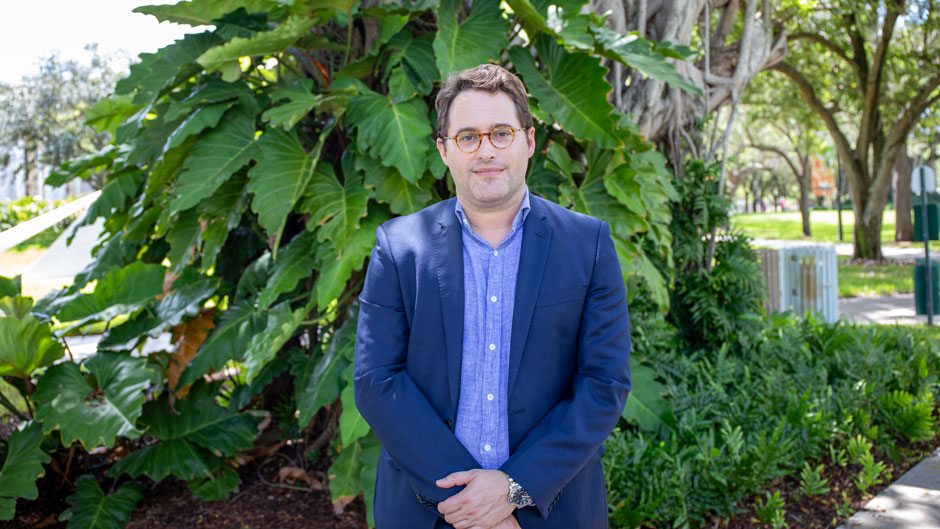In the past, universities often treated Indigenous peoples only as research subjects, rather than as communities with valuable knowledge to share. The Native American and Global Indigenous Studies (NAGIS) program at the University of Miami is committed to a different approach.
“Historically, Native peoples have been put under a microscope by universities and researchers and not one that they were asked about and not necessarily one that has always served them well,” said Raymond Orr, the director of NAGIS and the Elizabeth B. White Endowed Chair and Professor of Political Science. “What we’re trying to do is highlight the ways in which Native peoples have made contributions, and often have done so without recognition and under difficult circumstances.”
NAGIS not only educates students about the histories and perspectives of Indigenous peoples, but also provides opportunities for Indigenous peoples to share their experiences and knowledge. The program has hosted film screenings, art installations, lectures by Indigenous scholars and leaders, and community conversations with Indigenous peoples.
“The goal of NAGIS is to highlight a lot of the work that’s being done around Indigenous issues and experiences at UM,” Orr said. “The group seeks to bring people together around ideas, events, conversations, and teaching.”
As a political scientist and an enrolled member of the Citizen Potawatomi Nation, a federally recognized tribe in Oklahoma, Orr is especially interested in learning about the political worlds of Indigenous peoples. He earned a Ph.D. in political science from the University of California, Berkeley, and completed postdoctoral fellowships at Princeton University, Yale University, and the University of Washington.
“There’s much work to be done in this field, which makes it a great opportunity, but also a rather enduring challenge,” he said.
Following appointments at the University of Oklahoma, the University of Melbourne in Australia, and Dartmouth College, where he held the Hueston Distinguished Professorship in Native American and Indigenous Studies, Orr joined the University of Miami College of Arts and Sciences in 2023.
“Ray brings a wealth of experience with Native American studies in North America, but also his experience in Australia is really crucial,” said Traci Ardren, a professor of anthropology who has collaborated with Orr to organize conferences and events. “He not only thinks about global Indigenous experiences—he has lived and worked outside the U.S. with Indigenous communities, and he brings that perspective.”
Through NAGIS, Orr aims to connect professors and students from different disciplines across the university, including anthropology, public health, and modern languages and literatures.
His dedication to interdisciplinary collaboration also extends to his research. Orr is completing a National Institutes of Health grant that fosters collaboration with Native communities to determine how genomic research should be conducted and used to support tribal health and knowledge. Some Native peoples have concerns about scientists and policymakers using genomic research in unhelpful ways, Orr explained, but not participating in the research could prevent Native peoples from accessing benefits like precision medicine, which tailors treatments in part based on a person’s genes.
Orr is also collaborating with data scientists to study how Native and non-Native authors address the same topics in different ways. Using artificial intelligence, Orr and his colleagues are combing through 200 years of literature to compare how Native and non-Native writers employ terms related to nature, colonization, and geography that have different implications for Native and non-Native peoples.
“It's work like this that is really exciting because it’s using all kinds of methods to get at important questions about ethnic and cultural differences,” Orr said.
At the University of Miami, Orr sees opportunities to continue building on the existing expertise on campus and in local communities to help students learn more about Indigenous topics.
“UM is a vibrant place,” he said. “There’s a lot of potential for collaboration around research and curriculum.”

